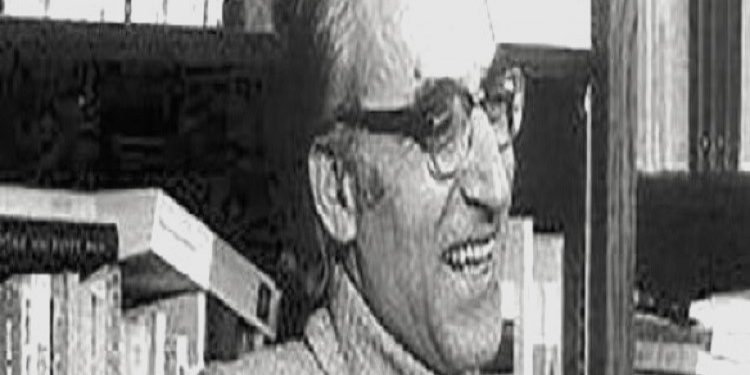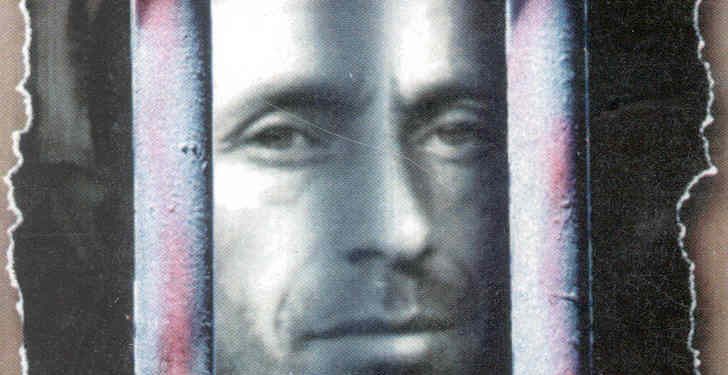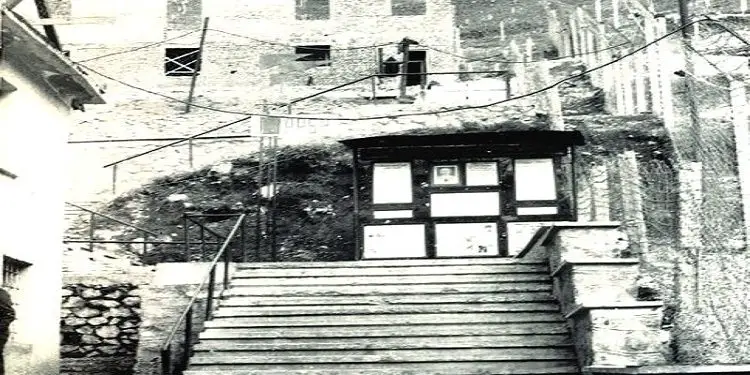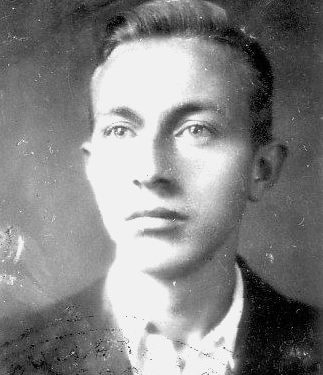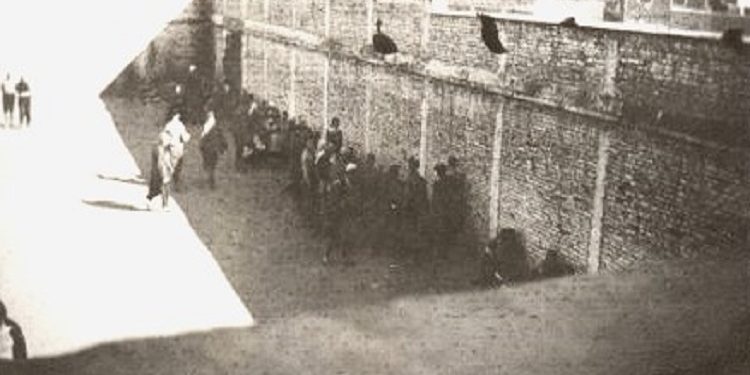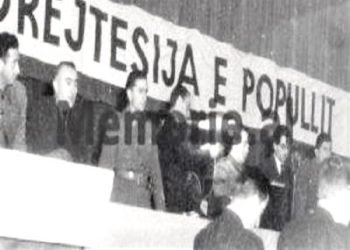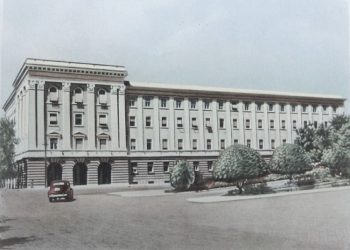By Uran Kalakulla
Part Thirty-Six
Nazism and Communism
Memorie.al / Nazism lasted 12 years, while Stalinism lasted twice as long. In addition to many common characteristics, there are many differences between them. The hypocrisy and demagogy of Stalinism was of a more subtle nature, which was not based on a program that was openly barbaric, like Hitler’s, but on a socialist, progressive, scientific and popular ideology, in the eyes of the workers; an ideology that was like a convenient and comfortable curtain to lie to the working class, to lull the sharpness of intellectuals and rivals in the struggle for power.
One of the consequences of this peculiarity of Stalinism is that the entire Soviet people, its best, capable, hardworking and honest representatives, suffered the most terrible blow. At least 10-15 million Soviets lost their lives in the torture chambers of the KGB, martyred or executed, as well as in the gulag camps and others like them, camps where it was forbidden to correspond (in fact they were prototypes of the Nazi death camps); in the mines in the ice of Norilsk and Vorkuta, where people died from cold, from hunger, from crushing work in countless construction sites, in the exploitation of forests, in the opening of canals and during transportation in leaded wagons, or in the flooded barns of the death ships.
Continued from the previous issue
The prisoner of the dictatorship was no longer a person, but a useless, annoying, hateful being, which should be eliminated as soon as possible. The person in prison was seen as a spiritual being that was not even worth an animal. We knew this very well, who were within the gloomy walls and bars of the prison. All the time, which constituted the most valuable part of human life: youth and manhood?
Because, since in these two periods of a person’s life, both physical and spiritual and mental strength are at their peak, these two parts of life, as everyone knows, are, in fact, life itself. Of course, also passing old age in prison is another pain, because, when one suffers terribly even before an open grave, the tears are even bitterer.
The man in prison, in relation to the miserable environment in which he finds himself, has two ways. First, to submit to the misfortune that has befallen him, by bowing down, by kneeling down, by desecrating himself, not only in the bad sense, that of moral degeneration, but also by surrendering to complete despair, which, inevitably, brings with it dullness, perdition, extreme spiritual languor and, after this or simultaneously with this, also the regime, premature exhaustion, malaise and death of the physical being. Everyone knows that usually, before the body dies, the soul has died.
The second path is the opposite of the first, which, in short, is the complete mobilization of the soul and mind, maximum effort not only to confront evil, but also to directly oppose it, that is, an active and courageous struggle. Of course, this mobilization is based on high consciousness, on persistent efforts to mobilize oneself, avoiding any weakness, laziness, melancholy or constant sadness, which eats away at the soul like acid. So, it was necessary to feed the mind with new ideas, strengthen the character, constantly perfect and educate the feeling. And especially the constant embraces of a truly manly courage. Because, as the people say, prison is for men.
Those who know how to appreciate the beauties of human life know very well the cultivating value of culture for the soul and mind of the highest being, among all living things on this earth, man. Just as water, which consists of two elements, culture also has knowledge and art in its very being, inseparable from each other. Therefore, I think it is not in vain that it has been said that knowledge and art are the true food of the soul, if it is understood as it was: mind and feeling at the same time, knowledge and song, poetry, art, science and philosophy.
In its beginnings, the communist prison, due to the very ignorance of those who administered it, seemed to be somewhat more “liberal”. And, since among the first anti-communists to enter prison were mainly intellectuals, along with sleeping clothes, dishes and bags of food, books also entered the prison, as their inevitable spiritual food. And these books traveled with them in every transfer, in every prison or forced labor camp. They were different: books on philosophy, jurisprudence, sociology, science, studies and criticism of literature and art, and genuine literary works. And of course, also manuals or language methods, along with their dictionaries. Thus, a kind of prison library was created, for collective use.
It is funny, but it seems that the “first socialist collective” (meaning communist), before it found application (with violence of course), throughout Albania, found a place (this time without violence, but completely freely, “democratically”), in the communist prison itself! Thus, until recently, especially in the Burrel prison, books circulated that had had their first owners; Ethem Haxhiademi, Koço Tasi, Gjergj Kokoshi, Kudret Kokoshi, Ethem Carën, Engjëll Kel Çobën, Arshi Pipën, etc. The more the years went by, the more they diminished, until one day they all disappeared, seized by the command, with a “concentrated blow”!
Taking advantage of the absolute ignorance of the prison command personnel, many convicts had managed (until recently) to insert the books that their families brought them, changing their covers with those of books by Marx, Engels, Lenin, Stalin, Mao, Enver, etc. For example, under Lenin’s “shirt”, there was Kautsky’s “Communism and Terrorism”, under the “Political Economy of Socialism”, by the University of Tirana, there was “Treatise on Political Economy”, by Charles Gide, under the “Labyrinths of Modernism”, by Alfred Uçi, there was Croce’s “Aesthetics”, and so on.
The books passed from hand to hand, silently, secretly and did their job. Of course: for those who wanted to learn. And, it was not for nothing that the name (less well-known than the first one) “Prison University” came about! Particularly widespread, even turning into a tradition, was the learning of foreign languages, mainly Western ones: English, French, Italian and German, which were the linguistic capital of our good intellectuals, educated in the West and who had been the first teachers of the first young prisoners. I have known some of these young people who, when they went to prison, did not know any foreign language. When they came out, they already knew not only one, but two, three, if not more.
Therefore, I say that in the forced labor camps (in fact, in these somewhat less, of course), but in the prisons (even more so in the one in Burrel), the school of foreign languages with a Western orientation was created earlier in the communist prison, than in the communist University of the communist state. Look, then, how reactionary and obscurantist the damned “enemies of the people” were! It seems like an unwritten law that where books circulate, there is also the cultivation of creation for knowledge, for art, and especially for literature. Here, then, is where what has been called “Prison Literature” has its source!
I myself, since I was imprisoned, knew Italian and French quite well. In prison I taught myself (since I had graduated from the Faculty of Language and Literature), English, German and Spanish. In fact, in Burrel prison, I helped with teaching and methods many others who asked me to do so (or by encouraging them myself). So, as I remember, in the first years of prison (especially during one period), I was busy teaching all morning, four hours in a row, without interruption, until my saliva dried up. I taught my friends Italian, French, German and Spanish.
And I did the work without any reward, at least a cigarette. For Italian, since I knew it better, I often designed the teaching method myself. One of these, with a hundred lessons (with text, vocabulary, and selected literary pieces, taken from an Old Italian anthology), I gave to a young man, who, after he had mastered it well himself, could use it to teach others. Thus, I earned the title of “professor,” which many ex-prisoners call me when I meet them, to this day.
And, to be honest, regardless of whether I deserve that title, I feel proud, not of it, but of the appreciation that my fellow sufferers give me, a hundred times prouder, than if they had given me the title of “doctor professor”, which, in our country, has become like those old-fashioned letters of commendation. I think that, in the current state that our unfortunate country has reached, if Albania has any abundant “production” to export, it is precisely these abundant “doctor-professors”. But I still worry if anyone will accept this commodity of ours?
I started writing at the age of thirteen, when I was a second-grade student at the Tirana gymnasium. It is known that the gymnasium at that time was eight years old. You could go there after you had completed primary school, which was five years, and also after you had turned twelve. I started writing poems and making good essays, which I teachers appreciated. So, gradually, during the gymnasium, I continued to write literary sketches. But not always.
And this for two reasons. First, I feared that they would become a reason to land me in prison, because their content spoke against the reality of the time, even directly against the system in power. Second, because I had thoroughly immersed myself in my selected studies in the field of literature, but also in philosophy, sociology, economics, jurisprudence, history, excluding the most pressing problems of natural sciences, especially biology, in addition to working as a teacher, mainly in the countryside.
So, no matter how much I rationed my time, it did not work out for everything. Something had to be left aside. And I left literary creations, which could wait. Therefore, since in prison my previous work in the field of knowledge, due to the lack of sufficient and abundant books, was greatly reduced, I devoted myself more strongly to literary creativity, but without neglecting, of course, previous socio-cultural studies and writings on them.
At home, I had left a large notebook with notes, but when I returned from prison, I found nothing. This was a great pain for me. Yes, what could I do? Kill myself?! Well, I had very valuable materials in them. Among them was a block of poems, mainly erotic, dedicated to my beloved daughter, the only one in my entire life, who was now my honored wife? That block bore the signature: “Poetic Diary”.
And I, from time to time, even in prison, at special moments, would add a new creation, which I would attach to the previous one, thus forming my only book of poetry, published so far, a book that bears the title: “Verges in Chains”, published in 1995. In the Rubik’s prison camp, I wrote also a kind of satirical poem, of twelve chapters, with the title:
“The Tyrants”, which someone took as a biting irony towards my political group, where it does not correspond to the truth at all? Such an act would be both vile and suicidal, towards me and my group mates. But I had neither lost my mind nor had I fallen morally. On the contrary! In that volume I had also dedicated poems to my family and, in particular, to my son, such as; “Grandfather”, “Mother” and so on. I did not find that book either when I got out of prison.
In the Elbasan prison camp, I wrote a long story, which I called then; “A Story in the First Person”. It was a 320-page volume in my fine handwriting, in ten arithmetic notebooks. It was an intimate story, about my constant love for the daughter of my heart. And, when I got out of prison, I did not find that one anymore. In the Fushe-Kruja prison camp, I had filled two thick notebooks, the Chinese ones of that time, with that fine writing.
There I dealt with problems of the philosophy of history, a subject that had attracted me all along. That work was called; “On the Internal Laws of History”, which, surprisingly, I had written the title in Italian on the cover: “Delle leggi innerenti della storia”. When I got out of prison, I couldn’t find this work either. In this prison camp, I also wrote a kind of treatise (tractatth) entitled; “On Personality”, a book that I thought would be useful for my son and his peers to build their personality once and for all.
This work was the fruit of my studies and my original thoughts. And, when I got out of prison, I couldn’t find this work either. I had managed to get all these writings out of the prison camps by trickery, when we were meeting with my wife, of course, endangering not only myself, but especially my wife. The way of getting them out, right under the police’s noses, is a story in itself.
I can say in short, only one thing: the prisoner in general and the political one in particular, becomes a hundred times more resourceful than the policeman from trouble. He invents much more refined methods than those of police intelligence, sharpening his mind like a razor. It is a means of protection, a means of saving what needs to be saved. It is at least one step ahead of the investigative methods of the State Security. And this has been proven many times in the prisons and prison camps of the communist dictatorship. In these ways I managed to get the series of my poems out of the Burrel prison, which I spoke about above. And all this right in front of the policeman and the guard officer, always in collaboration with my brave and heroic wife!
But, to be fair, first to myself and then to others who read this book, I must say that, in such actions, as dangerous and courageous as they were subtle and cunning, I used previous experience. The same experience that my brother-in-law, Arshi Pipa, had used before me, who had been able to communicate with his family through letters, while still in the investigation and who had managed to get his two poetic works out of Burrel prison; “The Prison Book” and the poem “Rusha”, as well as the philosophical one, written in Italian with the title ‘La mia concezione sulla vita” (‘My Conception on Life’).
In the Burrel prison, where I spent most of my sentence, a full 14 years, without moving from there, I also wrote several books, of which only one remains. The first was; “Gramatika metodike e għuħa shqipe”, with about 700 or so pages. This book was the fruit, both of my knowledge of the Albanian language, and of the twelve-year experience as a teacher of this language in seven-year schools. But, of course, the level here was higher. The purpose of that book was that anyone who felt the need, as an autodidact, could learn the basics of the grammar of our language without a teacher, since it was thought that he had not studied linguistics and that what he had learned in school once had remained in his mind.
It is a well-known fact that most of those who complete the full course of education, from primary school to high school, have little or no memory of the Albanian language. And this is for many reasons. But, in my opinion, the main thing is that the language in general education schools is taught more mechanically. And the fault for this lies as much with the textbooks as with the teachers themselves.
Of course, I am talking about years and years ago, because I am not aware of what is happening in our schools today, although, to be honest, a shadow of doubt still does not leave my mind. Teaching is an art in itself, just like theatrical art. And I am convinced that the ideal teacher is born, just as the poet, the artist is born. But with patience, perseverance and passion, the ideal teacher, the artist of teaching, can somehow be achieved.
I apologize to the reader that I may have been a little long-winded, but here my old passion for teaching took off. And that was precisely the first reason for me to write that voluminous grammar. But I also had two other reasons: my disappointment in a good part of my former teaching colleagues (whether in primary school or in seventh grade), in their proper mastery of the Albanian language.
The other reason was, so to speak, tactical, as a kind of camouflage of me from the watchful eye of both the prison operative and his deputies, who were present near me. So when they reported “upstream”, they would say that I almost did not participate in the “house” or “head-to-head” discussions at all, but I stayed upside down all the time, working on Albanian grammar! So, one way and two ways. / Memorie.al




